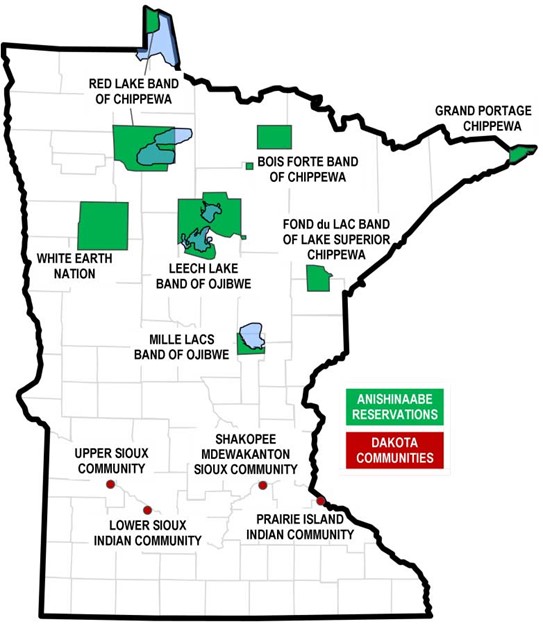Tribal Nations
There are 11 federally recognized Tribal Nations within the geographical boundaries of the state of Minnesota. Tribal Nations and their members have inherent rights and a political relationship with federal and state governments. The U.S. Constitution provides the foundation for recognizing the inherent sovereignty of Tribal Nations. The U.S. Supreme Court has confirmed that Tribal sovereignty predates the constitution and survives the establishment of the United States.
Minnesota’s cannabis law is among the strongest in the nation to honor and recognize Tribal sovereignty and the authority of Tribal Nations to make decisions about cannabis sales on Tribal land. As sovereign nations, Tribes determine how they want to regulate and oversee businesses—including cannabis businesses—on their land and determine if they wish to participate in the state’s legal cannabis market off Tribally regulated lands.
Compacts and cooperative agreements
A compact or a cooperative agreement is an intergovernmental agreement between sovereign entities. Under Minnesota state law (Minnesota Statutes, section 3.9228), the state of Minnesota, represented by the governor or their designee, may enter into such agreements with Tribal governments to address jurisdictional issues related to the medical cannabis and adult-use cannabis industries.
Learn more about Tribal Compacts and Cooperative Agreements.
Tribal contacts for state-licensed businesses
Cannabis compacts and cooperative agreements outline how the state and Tribal Nations will work together to promote a cooperative and mutually beneficial relationship to regulate cannabis and promote public health and safety. The compacts and cooperative agreements create unique opportunities for partnership between state-licensed cannabis businesses and Tribal Nations. Below is contact information for regulatory and operational offices within each Tribe that has an executed compact or cooperative agreement with the state.
| Tribal Nation | Tribal Regulatory Contact | Tribal Operator Contact |
|---|---|---|
| Bois Forte Band of Chippewa | Saydee Whitebird, Director of the cannabis regulatory commission
swhitebird@whitebirdlogistics.com |
Miranda Lilya, Executive director of enterprises
mlilya@boisforte-nsn.gov |
| Fond du Lac Band of Lake Superior Chippewa | Sherry Lafave, Chairperson
sherrylafave@fdlband.org |
echobos@fdlband.org
218-878-8080 |
| Leech Lake Band of Ojibwe | David Jones Jr., Executive director
david.jones2@llojibwe.net |
218-547-2902
info@sweetestgrass.com |
| Mille Lacs Band of Ojibwe | Becky Houle
218-591-0435 becky.houle@millelacsband.com |
Scott Hanson
shanson@lakeleafcultivation.com |
| Prairie Island Indian Community | Ed Buck, Cannabis regulatory commission chair
ed.buck@piic.org |
info@tokahedistribution.com |
| Red Lake Band of Chippewa Indians | Jason Siddens
218-553-4583 jason_siddens@redlakenation.org |
Terrell Charnoski
wholesale@nativecare.com |
| White Earth Nation | https://www.wemccc.com/
218-935-6414 wemccc@whiteearth-nsn.gov |
218-902-2070 |
Resources
The 11 Tribal Nations sharing territory with Minnesota
For more information on the individual 11 Tribal Nations within the geographical boundaries of Minnesota, visit their websites listed below.
- Bois Forte Band of Chippewa
- Fond du Lac Band of Lake Superior Chippewa
- Grand Portage Band of Lake Superior Chippewa
- Leech Lake Band of Ojibwe
- Lower Sioux Indian Community
- Mille Lacs Band of Ojibwe
- Prairie Island Indian Community
- Red Lake Nation
- Shakopee Mdewakanton Sioux Community
- Upper Sioux Community
- White Earth Nation
“Indian tribes have many rights, but the single most important—and most cherished—is the right of tribal sovereignty, the right to be self-governing.”
- Stephen Pevar


